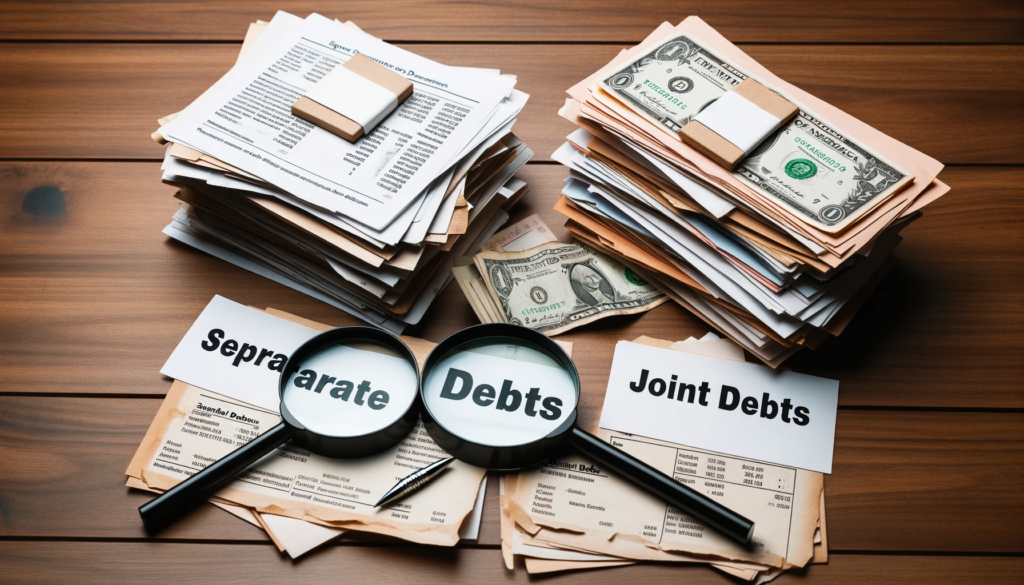Divorce can be a difficult and emotional time, and the financial considerations can often add to the stress. One of the most challenging aspects of divorce is the division of debts and liabilities. It is important to understand the complexities involved in splitting debts during a divorce and to protect your financial interests.
During a divorce, both parties are responsible for their share of any debts acquired during the marriage. This can include mortgages, credit card debts, personal loans, and other financial obligations. Splitting these debts can be complicated, as determining fair allocation requires consideration of multiple factors.
In this article, we will explore the legal principles that govern debt division in divorce proceedings in the UK, as well as the role of creditors in the process. We will also provide guidance on seeking professional advice, negotiating debt settlements, and rebuilding credit after divorce.





Key Takeaways:
- Divorce often involves the division of debts and liabilities acquired during the marriage.
- Splitting debt during a divorce can be complex and requires consideration of multiple factors.
- Seeking professional advice, assessing financial information, and negotiating settlements can help protect your financial interests during a divorce.
- Creditors may pursue both parties for repayment, regardless of the division of debts outlined in the divorce agreement.
- Shared debts and missed payments can negatively impact individual credit scores, so it is important to take steps to rebuild credit after divorce.
Understanding Marital Debts


When a couple decides to divorce in the UK, one of the most significant issues they face is dealing with outstanding debts, which can be a source of worry and stress for both parties. Marital debts refer to any debts that were incurred during the marriage. This could include anything from shared credit card bills to a joint mortgage. It’s important for both parties to understand how these debts are shared and divided during divorce proceedings.
Shared Debts
Marital debts are typically divided based on how they are owed. A joint or shared debt is one that is in both spouses’ names, and they are both responsible for paying it off. In such cases, both parties are equally responsible for the debt, regardless of who incurred it. Therefore, when dividing shared debts, each party is usually expected to pay an equal share of what is owed. However, there may be circumstances where one party is unable to pay their share, or the couple agrees on a different arrangement.
Divorce Debts
Divorce debts are the debts that are incurred during separation or divorce proceedings, such as legal fees and counseling costs. These debts are typically the responsibility of both parties, and they should be paid as soon as possible to avoid accumulating interest or potential legal consequences. It is recommended to seek legal and financial advice before incurring divorce debts, as these can be a significant financial burden.
Separate Debts
Separate debts refer to debts incurred by one spouse prior to the marriage. These debts are usually not shared equally during divorce proceedings, as they were not incurred during the marriage. Responsibility for separate debts depends on the nature of the debt and how it was used. For example, if a spouse incurred a debt before the marriage to purchase a personal item, such as a car, they will usually be responsible for paying it off. However, if the debt was used for a shared purpose, such as for household expenses, it may be divided equally.
Factors that Influence Debt Division
Several factors can influence how marital debts are divided during divorce. These can include the length of the marriage, who incurred the debt, the purpose of the debt, and the financial status of each spouse. For example, if one spouse has a higher income or greater assets, they may be allocated a larger share of the debt. Alternatively, if one spouse has taken on the majority of the household expenses during the marriage, they may be allocated a lesser share of the debt.
Protecting Against Creditors
It’s important to note that even if a divorce agreement outlines a specific distribution of debts between the parties, creditors may still pursue both parties for repayment. Therefore, it’s essential to take steps to protect oneself from creditor actions. This could include seeking legal advice, freezing joint accounts, and establishing a payment plan with creditors.
Understanding how marital debts are divided during divorce and taking steps to protect oneself can be crucial in safeguarding one’s long-term financial interests.
Identifying Separate debts
Separate debts refer to the debts incurred by one spouse prior to marriage. Such debts remain the responsibility of the individual who incurred them and do not need to be shared with the other spouse. However, in some cases, separate debts can become shared if they are paid using joint accounts.


It is essential to identify separate debts for proper debt division during divorce proceedings. The identification process can be complicated, and many factors must be taken into account, such as date and place of marriage, source of funds, and purpose of the debt.
In cases where one spouse takes on the other’s personal debts, the debts become shared. For example, if one spouse assumes the other’s student loan debt, it becomes joint debt, and both parties are responsible for repaying it.
It is crucial to seek legal advice to determine the responsibility for separate debts in a divorce. A qualified divorce solicitor can help identify and assess each party’s debts and guide them through the legal process.
Legal Principles for Dividing Debts
Dividing debts during divorce proceedings is a complex and often contentious process. The legal principles applied when dividing debts are designed to ensure a fair and equitable distribution of liabilities between the parties.
The first principle that is typically applied is that of equal sharing. This means that all debts incurred during the marriage are generally considered joint liabilities, and each party is responsible for 50% of the total debt. However, this is subject to several exceptions, such as debts that were incurred solely for business purposes or debts that were incurred after the couple separated.
When considering equal sharing, the court will take into account several factors, including the length of the marriage, the contributions made by each party, and the financial needs of each party following the divorce. This means that the court has some discretion based on what is considered fair in each individual case.
Legal Discretion Based on Fairness
The second principle applied in dividing debts is the court’s discretion based on fairness. This means that the court can depart from the principle of equal sharing if it is considered fair to do so.
For example, if one party has taken on significantly more debt than the other party during the marriage, the court may determine that it is fair to assign a greater share of the debt to that party. Similarly, if one party has significantly greater financial needs after the divorce, the court may assign a greater share of the debt to the other party.
It is important to note that prenuptial or postnuptial agreements can also impact debt division. If the couple has a valid agreement in place that outlines how debts will be divided, the court will generally be required to follow that agreement.
Overall, understanding the legal principles applied when dividing debts in divorce is crucial to protect one’s interests and ensure a fair outcome. Seeking legal guidance and engaging in open communication with one’s partner can help to navigate the complexities of debt division and safeguard one’s financial future.
Financial Disclosure and Assessment
In divorce cases, full financial disclosure by both parties is critical for determining a fair split of liabilities. This includes providing details of all income, assets, and debts. The assessment of finances may be done through negotiation or via court proceedings if agreement cannot be reached.
The financial disclosure stage requires each spouse to complete a Form E, which sets out their financial situation, including any debts owed. The information provided should be accurate and up-to-date, and both parties are expected to be open and transparent throughout the process.
Assessing the finances involves carefully examining the information provided by both parties. This will typically be done by a solicitor or financial advisor who will consider a range of factors, such as the length of the marriage, earning capacity, and financial contributions made by each spouse.
It’s worth noting that if one party has not fully disclosed their finances, this could impact the validity of any agreements or orders made. As financial settlements are based on the information provided, a failure to disclose assets or debts could result in an unfair distribution of liabilities. Therefore, it’s crucial to be truthful throughout the financial disclosure and assessment process.
Once the finances have been assessed, the parties can then work towards a settlement that is fair to both sides. This may involve dividing debts equally, transferring specific debts to one party, or other arrangements that best suit the circumstances of the case.
Negotiating Debt Settlements
Negotiating debt settlements during divorce proceedings can be a complex and emotionally charged process. It is important to approach these negotiations with a clear understanding of the debts involved and a willingness to compromise in order to reach a fair agreement.


There are several options for dividing debts in a divorce agreement. One option is to pay off joint debts together before finalizing the divorce. This can help both parties to start fresh without any lingering financial ties. Alternatively, couples may agree to transfer the debts to one party, who will take sole responsibility for repayment.
Another option is to sell off assets to cover outstanding debts. For example, selling a jointly owned property or car can provide the funds needed to pay off a joint loan. It is important to seek legal advice when considering any of these options, as they can have significant financial implications for both parties.
Debt Division
When dividing debts in a divorce agreement, it is important to take into account the financial situation of both parties. This includes factors such as income, assets, and future earning potential. In some cases, it may be necessary to divide debts unequally in order to provide for the financial needs of each individual.


It is also important to consider the impact of joint debts on credit scores. Missed payments or defaults can have a negative impact on credit scores, making it difficult for either party to secure loans or credit in the future.
Seeking Legal Advice
Negotiating debt settlements during divorce can be a highly emotional and stressful process. It is important to seek the advice of a professional, such as a divorce solicitor or financial advisor, who can provide objective guidance and support.
A divorce solicitor can assist with the legal aspects of debt division, such as drafting a legally binding agreement that outlines the responsibilities of each party. They can also provide advice on how to protect oneself from potential creditor actions.
A financial advisor can help assess the financial implications of different debt division options and provide advice on how to rebuild credit after divorce.




In Summary:
Negotiating debt settlements during divorce can be a challenging process, but it is important to approach negotiations with a clear understanding of the debts involved and a willingness to compromise. Seeking the advice of a professional can help to protect one’s interests and ensure a fair and equitable division of debts.
Role of Creditors in Debt Division
When it comes to dividing debts in a divorce, it is important to understand the role of creditors in this process. Creditors are third-party lenders who are owed money by one or both parties.
In most cases, creditors are not bound by the divorce agreement and may continue to pursue both parties for repayment of the outstanding debt, regardless of the division of debts outlined in the divorce agreement.
This means that if one party fails to pay their share of a joint debt, the creditor may seek repayment from the other party, who may be held responsible for the entire debt, even if they have already paid their share as per the divorce agreement. Additionally, late or missed payments can significantly impact the credit scores of both parties.
It is crucial to consider the rights of creditors when negotiating debt division during divorce proceedings to avoid potential credit problems in the future. Seeking legal advice from a divorce solicitor can be helpful in understanding the legal obligations and protecting one’s interests.
If creditors continue to pursue the debt after the divorce is finalized, it may be necessary to consult with a debt collection agency to help resolve the issue. It is essential to take action promptly to avoid further damage to one’s credit reputation and financial stability.
Creditor Rights
Under UK law, creditors have the right to pursue debt repayment from both parties, regardless of the divorce agreement. If one party fails to pay their share of the joint debt, the creditor may seek full payment from the other party. Creditors may also take legal action, such as obtaining a county court judgment (CCJ) against the debtor in the event of non-payment, which can further impact the credit score of both parties.
Therefore, it is essential to work with a divorce solicitor to ensure that debt division is fair and legally sound, taking into account the impact of creditors’ rights on both parties.
Impact on Credit Scores
Divorce can have a significant impact on one’s credit scores and overall financial reputation. When shared debts are not properly addressed during divorce proceedings, missed payments or defaults can harm both spouses’ creditworthiness and make it difficult to secure new forms of credit in the future.
It is important to monitor credit reports regularly to ensure that all joint debts are being paid as agreed. If a former spouse fails to make a payment on a shared debt, it can negatively impact the other spouse’s credit score and increase the amount owed.
One way to protect oneself is to close joint accounts or transfer balances to individual accounts wherever possible. This can help prevent missed payments or defaults on shared debts, and limit the financial fallout of a divorce.
If credit scores have been adversely affected by divorce-related debts, there are steps that can be taken to rebuild credit over time. These include paying bills on time, reducing outstanding balances, and maintaining a healthy mix of credit types.
Seeking the guidance of a financial advisor or credit counselor can also be helpful in developing a plan to rebuild credit and improve financial stability after a divorce.
Seeking Professional Advice
Divorce proceedings can be emotionally and financially challenging, especially when dividing debts and liabilities. Seeking professional advice can provide crucial guidance and support during this difficult time.


Divorce Solicitor
A divorce solicitor can help you navigate the legal complexities of debt division. They can provide advice on your rights and options, negotiate on your behalf, and ensure that any agreements reached are legally binding. A solicitor can also offer emotional support and help you manage the stress of the divorce process.
Financial Advisor
A financial advisor can provide valuable insights into the financial implications of divorce, particularly when it comes to debt division. They can assess your current financial situation, help you understand your options for managing and distributing debts, and provide guidance on rebuilding your credit after the divorce. A financial advisor can also help you with long-term financial planning and ensure that your interests are protected in the settlement.
It’s important to select a divorce solicitor and financial advisor who are experienced in dealing with divorce cases and can provide the support you need. Don’t be afraid to seek referrals from trusted sources or to interview potential advisors to ensure that you find the right fit for your needs.
Conclusion
Divorce can be a challenging time, especially when it comes to dealing with debts and liabilities. However, with the right approach, it is possible to safeguard your interests and ensure a fair division of financial responsibilities.
Throughout this article, we have discussed the complexities involved in splitting debts and liabilities during a divorce in the UK. We have explored the legal principles applied when dividing debts, the importance of financial disclosure and assessment, and the role of creditors in the debt division process.
To protect your long-term interests, it is crucial to seek professional advice from a divorce solicitor or financial advisor. These experts can provide guidance on negotiating debt settlements, identifying separate debts, and minimizing the impact on your credit score.




Remember!
Open communication and transparency are key to achieving a fair and equitable division of debts. By taking proactive steps and seeking legal guidance, you can safeguard your financial interests and move forward after divorce with confidence.



FAQ
How are debts and liabilities divided during a divorce in the UK?
The division of debts and liabilities during a divorce in the UK depends on various factors, such as the type of debt, individual financial circumstances, and the court’s discretion. It is essential to seek legal advice to understand your rights and responsibilities.
What are marital debts?
Marital debts are debts incurred during the course of the marriage. These can include mortgages, credit card debts, loans, and other financial obligations that both spouses are responsible for. These debts are typically subject to division during a divorce.
How are separate debts treated during a divorce?
Separate debts are debts that one spouse incurred before the marriage. Generally, these debts are not automatically divided during a divorce, but the court may consider them when determining the overall financial settlement. It is advised to consult with a solicitor to understand the specific circumstances surrounding separate debts.
What legal principles apply to debt division in divorce?
The court aims for a fair and equitable distribution of debts during divorce proceedings. Legal principles such as equal sharing and the court’s discretion to consider individual circumstances and fairness come into play. Prenuptial or postnuptial agreements may also impact debt division.
How does financial disclosure work during a divorce?
Financial disclosure involves providing comprehensive information about assets, income, and debts to ensure a fair division of liabilities. Both spouses are required to make full and honest financial disclosures. Failing to do so can have serious consequences. It is advisable to consult with a solicitor to navigate this process.
Can debts be negotiated and settled during a divorce?
Yes, debts can be negotiated and settled during divorce proceedings. This may involve options such as paying off debts jointly, transferring debts to one party, or selling assets to cover debts. Seeking legal advice is crucial to ensure a fair and legally binding debt settlement.
What role do creditors play in the debt division process?
Creditors are not bound by the division of debts outlined in the divorce agreement. They can pursue both parties for repayment regardless of the agreed-upon responsibilities. It is essential to understand the potential creditor actions and take appropriate steps to protect your interests. Seeking legal advice is recommended.
How does divorce impact credit scores?
Divorce can impact credit scores if shared debts are not managed properly or if payments are missed. It is important to make timely payments and communicate with creditors during the divorce process. Taking steps to rebuild credit after divorce, such as establishing individual accounts, can help mitigate the impact on credit scores.
Should I seek professional advice for debt division during divorce?
Yes, seeking professional advice from a divorce solicitor or financial advisor is highly recommended when dealing with debt division during divorce. They can provide guidance on your rights and responsibilities, help negotiate debt settlements, and ensure your long-term financial interests are protected.





Leave a Reply